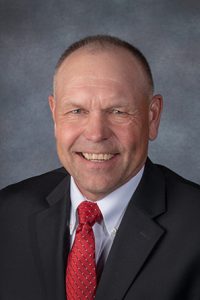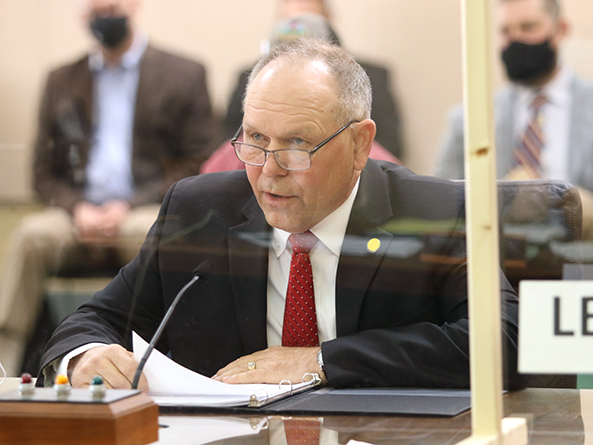Agricultural equipment right-to-repair bill considered
Owners of modern farm machinery would have the same access as authorized dealers to the software tools, technical manuals and parts needed to make repairs under a bill heard Feb. 25 by the Judiciary Committee.
LB543, introduced by Sen. Tom Brandt of Plymouth, would require original equipment manufacturers to make available, on fair and reasonable terms, the documentation, parts and tools needed to diagnose, maintain or repair electronics-enabled agricultural equipment to independent mechanics or the equipment’s owner.
Violating the act — which would apply to equipment sold or in use in Nebraska on or after its effective date — would be an unlawful practice under the state Uniform Deceptive Trade Practices Act.
Brandt said software-driven tractors, combines, center pivots and other farm equipment are more efficient than their analog forebears, but their increasing complexity has allowed manufacturers to restrict the tools and documentation necessary to make repairs to authorized dealers.
He said LB543 is intended to allow farmers and ranchers to make simple repairs themselves, saving them time and money.
“As a farmer, I’m overjoyed when I snap a piece of steel because I can get that off the shelf — I can fix that,” Brandt said. “But when I’ve got code problems, that’s another story.”
Brandt brought an amendment to the hearing that he said is intended to address the concerns of equipment dealers and manufacturers. Among other changes, it would define “fair and reasonable,” remove a provision allowing owners to access security-related functions and clarify that the proposal would not authorize owners to modify equipment.
Lance Atwater testified in support of the bill and the amendment on behalf of the Nebraska Farm Bureau and six other agricultural groups.
He said manufacturers and right-to-repair advocates had hoped to have a memorandum of agreement in place by early this year, but negotiations stalled. Auto manufacturers have made a similar agreement under which owners and independent repair shops can buy the diagnostic equipment and tools needed to repair cars, Atwater said.
“Our members feel strongly about having the same flexibility in farm equipment repair that’s available in the automobile industry,” he said.
Jerrad Stroh, who farms near Juniata, also testified in support. He said most dealerships charge a flat fee for a service call, plus mileage and an hourly service charge. If he had access to the electronic diagnostic tool that gives detailed information about an equipment failure, he said, he could make simple repairs himself rather than wait for a technician.
Vern Jantzen testified in support of the bill on behalf of Nebraska Farmers Union. In many parts of the state, he said, farmers and ranchers can face long wait times for a technician during the busiest times of the year.
“Most farmers will tell you that downtime is money lost during planting and harvesting operations,” Jantzen said.
Grant Suhre, manager of customer support for John Deere in the U.S. and Canada, testified in opposition to LB543. He said the company supports its customers’ ability to repair their machines but not to modify them or tamper with emissions controls.
To that end, Suhre said, John Deere has made available all tools, diagnostic equipment and technical manuals needed to make repairs.
“We don’t believe we need legislation to enable customers to repair their machines,” he said. “We’ve already enabled that.”
Trevor Mecham testified in opposition to the bill on behalf of Valley Irrigation. He said automated center pivot irrigation systems soon will use artificial intelligence software to determine when, where and how to spray for pests and disease. Those applications will require a higher level of expertise to troubleshoot, Mecham said.
“Giving uncertified access to independent third parties who have not gone through proper certification and training could materially and negatively impact growers’ attempts to produce greater yields with greater operational efficiency,” he said.
Also in opposition was Kevin Clark, CEO of AKRS Equipment Solutions. He said the company, which operates 26 John Deere dealerships across Nebraska, answers service calls around the clock and usually can send a technician to a customer’s farm within 24 hours.
“With hundreds of different repair shops outside the John Deere dealer network,” he said, “there is ample ability to get equipment repaired throughout the state.”
The committee took no immediate action on the bill.


